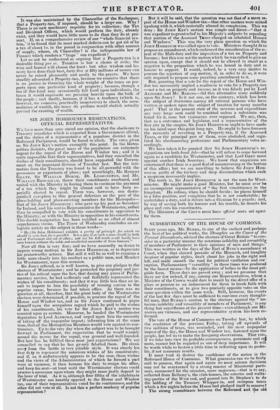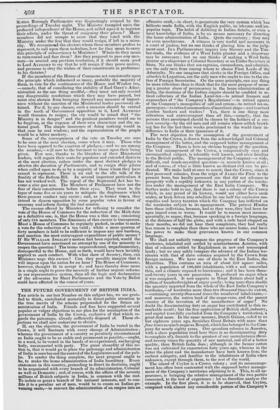SUBSERVIENCY OF THE HOUSE OF COMMONS.
Sixev years ago, Mr. BURIiE, in one of the earliest and perhaps the best of his political works, the Thoughts on the Cause of the Present Discontents, advised the electors of Great Britain " to con- sider in a particular manner the notorious infidelity and versatility of members of Parliament in their opinions of men and things."
This was written in the days of the Earl of BUTE'S ascendancy at Court, when that shrewd parasite of the Monarch, and haughty despiser of popular rights, dealt about his jobs to the right and left, and made smooth the road for political vacillation and cor ruption. Parliamentary " versatility " in those times was produced by the basest means—by the application of bribes in the most pal- pable form. Those days are passed away ; and we presume that there are few indeed, if any, among our Representatives, whom a Minister of the Crown wculd dare to insult by the direct offer of a place or pension as an inducement for them to break faith with their constituents, or to give two precisely opposite votes on the same question within the same week. Still, however, the events of the last few (lays must be sufficient to convince every thought- ful man, that BURKE'S caution to the electors against the " no- torious infidelity and versatility of members of Parliament," is any thing but superfluous at the present time—even although our Mi- nisters are virtuous, and our representative system has been re- formed.
The vote of the House of Commons on Tuesday last, by which the resolution of the previous Friday, taking off upwards of two millions of taxes, was rescinded, and the most unpopular impost of the day, the House and Window tax, fastened upon the people, has led us to make the foregoing observations. That vote, if we take into view its probable consequences, proximate and re: mote, cannot but be regarded as one of deep importance. It will be worth while to bestow a little time in reflecting upon its proba- ble, if not necessary results.
It must tend to destroy the confidence of the nation in the Reformed House of Commons. What guarantee can we be fairly said to possess, that again and again its most solemn decisions may not be overturned by a strong muster of Ministerial parti- sans, summoned for the occasion, more majorum,—that is to say, collected from Bellamy's, the club-houses, the coteries and waltz- ing-parties of the West end, and poured into St. Stephen's to do the bidding of the Treasury Whipper-in, and reimpose taxes which a few nights before the House had pledged itself to remove? • The strong resemblance between the Reformed and the old Rotten Borough Parliaments was disgustingly evinced by the proceedings of Tuesday night. The Ministry trampled upon the professed independence of the House, and called upon it to register their edicts, under the threat of resigning their places! Many members did not scruple to avow that they voted with the Ministry under the fear that they would resign, if left in a mino- rity. We recommend the electors whom those members profess to represent, to call upon them to declare, how far they mean to carry this principle of subserviency to Ministers? Where do they mean to turn round and face them ? Are they prepared to pass any mea- sure—to rescind any previous resolution, if it should seem good to Lord ALTHORP to say that he will resign if they prove restive, and presume to obey the wishes of their constituents in preference to his dictates ?
If the members of the House of Commons act consistently upon the principle which influenced so many, probably the majority of them, to vote for the continuance of the House and Window tax, —namely, that of considering the stability of Earl GREY'S Admi- nistration as the one thing needful,—they must not only rescind any disagreeable resolutions which they may have passed, but must also abstain from bringing forward any measure of import- ance without the sanction of the Ministerial leader previously ob- tained. For if, by any chance, such a measure should be carried in the teeth of Government opposition to it, Lord ALTHORP would threaten to resign ; the cry would be raised that "the Ministry is in danger !" and the penitent members would sue to be forgiven, at the expense of their own characters and the na- tional good. The simple innocence of doing nothing would in that case be real wisdom; and the representation of thepeople would be a bitter mockery. Some of the consequences of the vote on Tuesday are sure to be seen at the next election, come when it may. Those who have been opposed to the exaction of pledges,—and we are among the number,—will now be the foremost to insist upon their beim,. given. Few now, thanks to the blunders of their Ministerial leaders, will regain their seats for populous and extended districts at the next election, unless under the most distinct pledges to shorten the duration of Parliaments, and to resign their places when called upon to do so by a majority of those whom they have ceased to represent. There is an end to the idle talk of the finality of the Reform Bill. In several important particulars it has not worked well. The repeal of the Septennial Act has be- come a sine qua non. The Members of' Parliament have not the fear of their constituents before their eyes. They trust to the lapse of some five or six years to mitigate the displeasure which their present conduct may excite ; and, as in former times, they intend to disarm opposition by some popular votes in favour of economy and reform during the last session. The excuse offered by Ministers for refusing to consider the vote of the House of Commons for the reduction of the Malt-duty as a definitive one, is, that the House was a thin one ; consisting of only 316 members. The flimsiness of this excuse is transparent. Must a House of Commons be regularly packed, in order to make a vote for the reduction of a tax valid; while a mere quorum of forty members is held to be sufficient to impose any new burdens, and sanction the most extravagant expenditure of public money ? If Sir WILLIAM INGILBY'S motion had been rejected, would the Government have sanctioned an attempt by one of the minority to reopen the question? The terms unprecedented, =parliamentary, disrespectful to the House, and so forth, would have been lavishly applied to such conduct. With what show of decency, then, can Ministers urge this excuse? Can they possibly imagine that it will impose upon the nation for an hour ? The House of Commons, however, thought fit to accept it; and have thereby done more in a single night to prove the necessity of further organic reforms in our representative system, than all the logic and declamation of the advocates for Short Parliaments and the Vote by Ballot could have effected in the course of years.



















 Previous page
Previous page